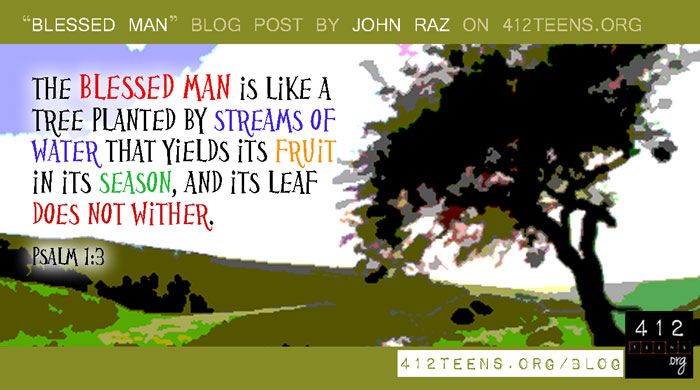Blessed is the Man

Posted by John Raz on 7.8.13
For those of you who love literature in school, there isn't a better place to turn to find great literature than the Psalms. The Psalmists often used very beautiful imagery to get their point across. But this isn't just poetry; the psalms are also very useful for life and wonderful to read. They are very personal writings, often showing the deepest emotions of the writers.
Psalm 1 starts off this massive book of the Bible with a bang, showing what the "Blessed Man" looks like. By the way, this annotation has nothing to do with gender. The word "man" in verse 1 is the Hebrew word ish, which is used here to describe a representative example of a godly person.
Will you pick apart this Psalm together with me? Because I hold Psalm 1 dear to my heart. Here it is:
Blessed is the man who walks not in the counsel of the wicked,
nor stands in the way of sinners, nor sits in the seat of scoffers;
but his delight is in the law of the Lord,
and on his law he meditates day and night.
He is like a tree planted by streams of water that yields its fruit in its season,
and its leaf does not wither.
In all that he does, he prospers.
The wicked are not so, but are like chaff that the wind drives away.
Therefore the wicked will not stand in the judgment,
nor sinners in the congregation of the righteous;
for the Lord knows the way of the righteous,
but the way of the wicked will perish.
—Psalm 1
The first verses are somewhat self-explanatory. The man who doesn't take advice from wicked people and doesn't walk in their way is certainly blessed. The man who delights in the law of the Lord is described as a tree planted by streams of water. I grew up on a farm, so, to me, this is imagery is close to home.
My family planted, by hand, over 7,000 plants per year, then harvested produce from them. We had to irrigate the fields by running a hose past each plant in the field and allowing it to drip continuously each day. Sometimes this would drain our well to the point that our drinking water and toilet water were both brown with dirt! If we had been near a stream, a creek, or a river, we could have had a much easier time watering these without worry of running out of water for ourselves.
So, in keeping with the imagery of a tree, because this tree is near water, it yields fruit in season, and its leaves do not wither. The tree is the "Blessed Man," and the stream of water is the word of God, the Bible.
In the middle of Psalm 1, the psalmist says a pretty cool truth, but one that must be clarified first. He says, "in all that [the 'Blessed Man'] does, he prospers." What a statement! But this prosperity is not without rhyme or reason or condition. This prosperity comes because the "Blessed Man" delights in the law of God, and therefore seeks the things of God.
Jesus said, "But seek first the kingdom of God and His righteousness, and all these things will be added to you" (Matthew 6:33). The "Blessed Man" prospers because in meditating day and night on God's word, a godly person is taught to seek the kingdom of God and His righteousness. Therefore, "all these things" will be given.
Psalm 37:4 says, "Delight yourself in the Lord, and He will give you the desires of your heart." Do you want to be like this "Blessed Man"? Are you delighting in God and in His word? Are you meditating on it day and night? What do you need to do to seek and find joy in God through His Word?
—John Raz


Writer: John Raz
John Raz is a diabetic who enjoys writing, playing guitar, and photography. He rarely knows what to put in his own bio because he's not good at talking about himself, but he would love to talk to you about Christ!
